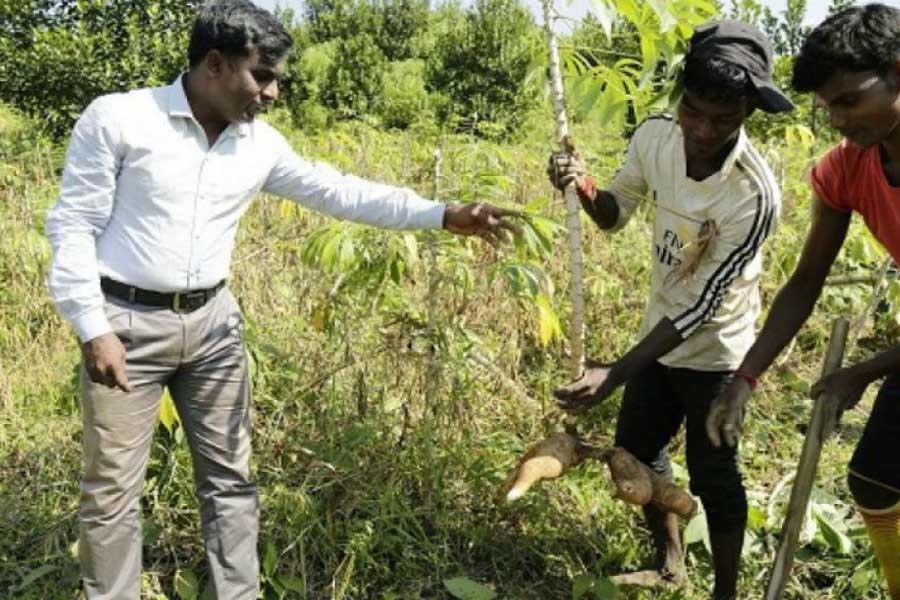Exporters of vegetables and agro-products are reportedly upset at the decision of the government making contract farming mandatory for export. The shock is quite understandable as the decision came right at the peak of the harvesting time of winter vegetables and many other horticulture produces.
Now, while there are reasons for exporters to worry about their current and future shipments, the fact remains that the decision cannot be said to have landed out of the blue. In fact, there were talks among the concerned quarters for some time about contract farming as a means to ensuring quality and compliance needs of the destination countries, particularly the EU countries.
The Plant Quarantine Wing (PQW) under the Department of Agriculture Extension (DAE) of the agriculture ministry issued the aforementioned directive late last year, making Good Agricultural Practice (GAP) and contract farming mandatory for exporting vegetables, fruits, potato, betel leaf and other agro-products. The directive that came into force from January 16, stipulates that to be eligible to export, exporters are required to present documents detailing that they have maintained GAP, hazard analysis and critical control points (HACCP), traceability and maximum residue limit (MRL) and that their products were collected from contract growers under the supervision of upazila agriculture officer.
The directive came against the backdrop of falling exports of agro-products over the past few years and also in view of the market trends suggesting no visible prospect of reviving export growth given the problems regarding quality and standard compliance. Although some corrective measures were reportedly taken to meet compliance requirements of the target markets, farm products are not at all doing well in export markets. It was reported that export of agro-products slumped as low as by 25.7 per cent in the July-October period compared to the corresponding period of the previous year. According to Export Promotion Bureau (EPB) data, export of farm products is facing a steep decline year on. Farm product export was all time high at $615 million in FY'14, but has been experiencing regular decline since then. This has been largely due to restrictions and temporary ban on some of prospective horticulture and vegetable products, including potatoes, fruits and vegetable in the target markets in Europe and Russia due to noncompliance of sanitary and phyto-sanitary requirements, strictly maintained in those markets.
Although the ban and restrictions were withdrawn on a number of products, shipments from Bangladesh were denied access at the ports of entry on various grounds of noncompliance. Shipments were also turned down due to presence of pests. According to the EU Food and Veterinary Office report, a total of 143 export consignments from Bangladesh were rejected during the first half of the last year at various EU ports. The EU had been quite candid in its actions in the past as regards many of the Bangladeshi farm products and left no doubts in making its intentions known. The EU had also sought government actions on some farm products including vegetables which were found noncompliant repeatedly. Although there were stray moves by the government to apply strict quarantine on exportable farm produces and products in keeping with the required norms in the overseas markets, the scenario did not much improve.
One of the reasons, other than the incidents of deliberate flouting of compliance norms, is believed to be due to the fact that farm products for export are procured from various locations, often from small farmers, which makes a likely case for lack of uniformity on scale and in quality. No organised mechanism has yet emerged in the country to facilitate procurement in a big way ensuring quality and related standards.
It is this serious limitation that triggered the idea of contract farming. Experts are of the view that in order to be able to grow produces on a uniform scale and of quality, the key requirement, among others, is bulk production, which under the existing method of production cannot be ensured. Contract farming is thus believed to be the only alternative, in that it can offer an opportunity for farm produces to be grown in a quality package capable of ensuring market-specific standards. Observers also hold that under contract faming, fruits such as bananas, pineapples among others can prove to be highly rewarding as exportable products.
Following issuance of the directive on contract farming, the Plant Quarantine Wing (PQW) of the Department of Agriculture Extension (DAE) has been echoing optimism for quality assurance of farm products for both internal and external marketing.
The move by the government has not been very well received by the exporters, understandably because they are now to part with their past practice of procurement and move to a new one that is yet to fully emerge. True, they will face difficulties at the start-up phase, but it must be agreed that contract farming has immense merit not only for accessing the tightly regimented export markets but, more importantly, for bringing a sea change in the cultivation pattern and increasing production of farm produces.


